Syngene International Bundle
How has Syngene International shaped the Indian biotech landscape?
Born from Biocon in 1993, Syngene International emerged as a trailblazer in India's Contract Research Organization (CRO) sector. This Syngene International SWOT Analysis will help you understand the company's journey. From its inception, Syngene has been instrumental in supporting global pharmaceutical and biotech companies. Its evolution is a testament to the growth of the Indian biotech industry.
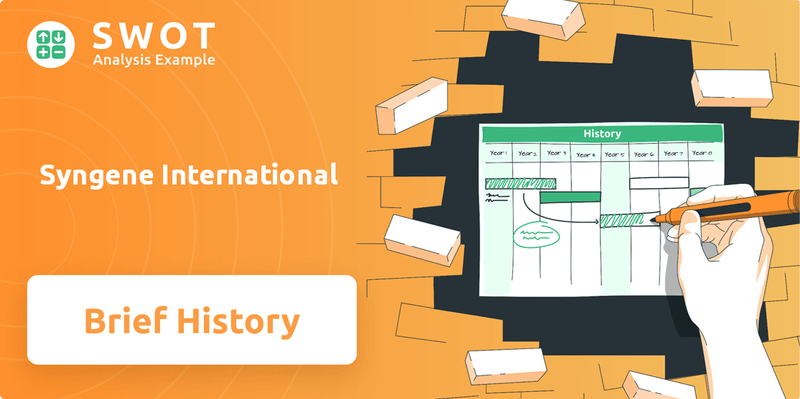
This brief history of Syngene International company will explore its pivotal role in biologics research and development. We'll examine how Syngene, an Indian biotech leader, has expanded its services, including drug discovery and manufacturing capabilities. Understanding Syngene's history is crucial for anyone interested in the company's financial performance and future collaborations within the biopharmaceutical company sector.
What is the Syngene International Founding Story?
The story of Syngene International began on November 18, 1993, in Bengaluru, Karnataka. Initially named Syngene International Private Limited, the company was founded under the guidance of Kiran Mazumdar-Shaw, the visionary behind Biocon. It started as a subsidiary of Biocon, marking its entry into the burgeoning field of contract research.
The primary aim of Syngene was to become India's first Contract Research Organization (CRO). Its mission was to offer custom research services to support the research and development (R&D) programs of international innovative companies. This strategic positioning allowed Syngene to capitalize on the growing trend of outsourcing R&D activities within the pharmaceutical and biotech sectors.
Syngene's initial business model focused on providing outsourced services for discovery and development across several sectors. These included pharmaceuticals, biopharmaceuticals, nutraceuticals, animal health, and agrochemicals. The move to a public limited company in 2007, changing its name to Syngene International Limited, marked a significant step in its evolution.
Here's a quick overview of the key milestones in Syngene's early years:
- Incorporation: November 18, 1993, as Syngene International Private Limited in Bengaluru.
- Founder: Kiran Mazumdar-Shaw, founder of Biocon, spearheaded the venture.
- Parent Company: Established as a subsidiary of Biocon.
- Business Model: Focused on providing custom research services as India's first CRO.
- Service Areas: Targeted pharmaceuticals, biopharmaceuticals, nutraceuticals, animal health, and agrochemicals.
- Ownership Shift: In March 2002, Biocon acquired 99.9% of Syngene's equity shares.
- Public Transition: Changed to a public limited company in 2007, becoming Syngene International Limited.
The establishment of Syngene within the Biocon ecosystem provided a strong foundation for its early operations and growth. Although specific details about initial funding sources beyond its subsidiary relationship with Biocon are not readily available, the backing from Biocon was crucial. For a deeper dive into the company's journey, you might find insights in this article about the history of Syngene International.
Syngene International SWOT Analysis
- Complete SWOT Breakdown
- Fully Customizable
- Editable in Excel & Word
- Professional Formatting
- Investor-Ready Format
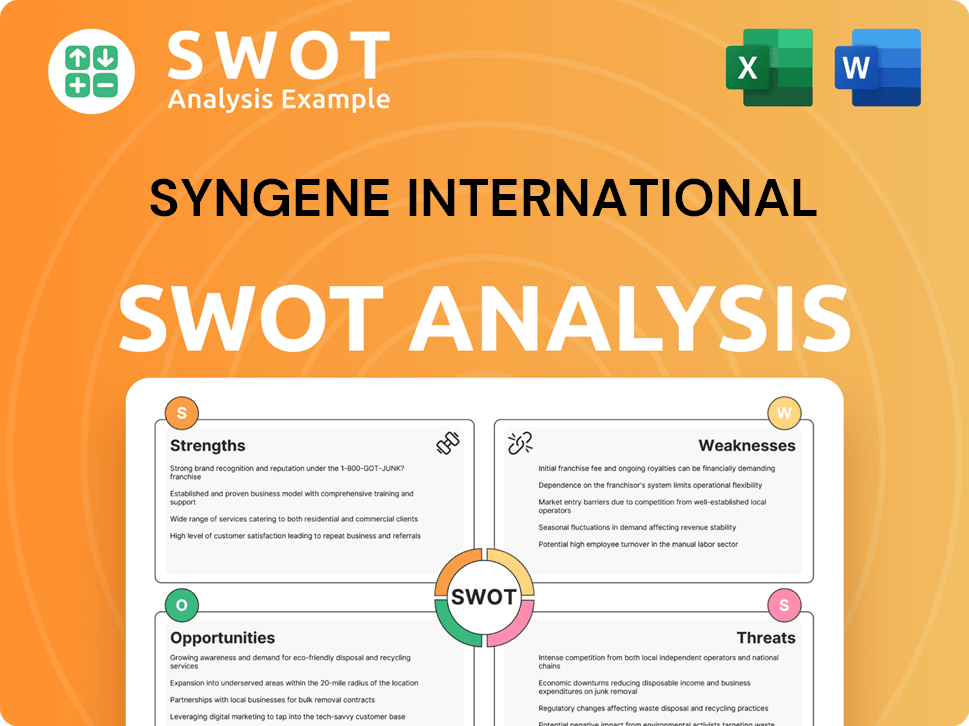
What Drove the Early Growth of Syngene International?
The early growth of Syngene International was characterized by a strategic expansion of its service offerings and infrastructure. This expansion included venturing into chemical development and establishing key partnerships. These moves were supported by significant investments in research and manufacturing capabilities. Furthermore, the company's growth was marked by its listing on Indian stock exchanges and a growing client base.
In 2001,
A significant milestone was the establishment of a Syngene-Bristol Myers Squibb research facility in Bengaluru in 2009. In 2012, Syngene collaborated with Abbott to open India's first nutrition R&D center. These collaborations highlighted the company's ability to secure major international partnerships, crucial for its expansion.
Early operational expansion in R&D increased lab space to over 23,000 sq. ft. The company became a publicly listed company on Indian stock exchanges (NSE and BSE) in 2015. These expansions supported Syngene's growth trajectory.
Over the past five years, the
Syngene International PESTLE Analysis
- Covers All 6 PESTLE Categories
- No Research Needed – Save Hours of Work
- Built by Experts, Trusted by Consultants
- Instant Download, Ready to Use
- 100% Editable, Fully Customizable
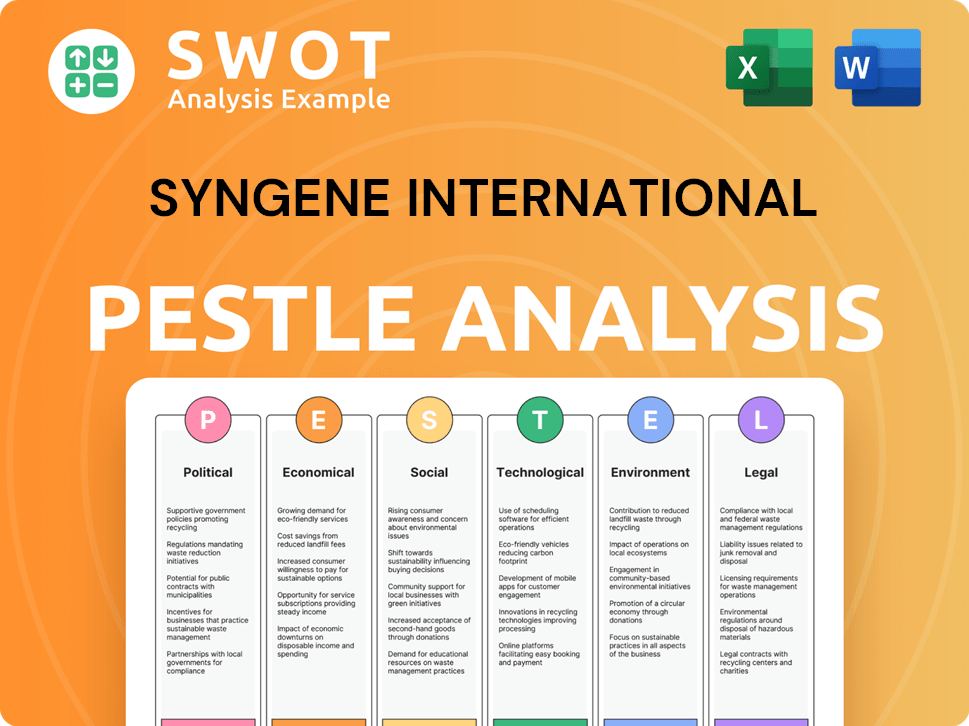
What are the key Milestones in Syngene International history?
The Syngene International has achieved several key milestones throughout its history, establishing itself as a significant player in the biopharmaceutical industry. These achievements highlight its evolution and strategic growth in the contract research and manufacturing sectors. The company's journey reflects its commitment to innovation and its ability to adapt to the dynamic demands of the global market.
| Year | Milestone |
|---|---|
| Ongoing | Transformation into an integrated Contract Research, Development, and Manufacturing Organization (CRDMO), offering end-to-end services. |
| Ongoing | Establishment of major partnerships with global pharmaceutical giants, including long-term contracts with Bristol-Myers Squibb and Zoetis. |
| 2023 | Acquisition of a biologics manufacturing facility in the US, expanding its capacity and market presence. |
Syngene International has consistently focused on innovation to enhance its service offerings. The company's SynVent platform exemplifies this focus, providing an effective means to advance programs through various stages of drug development. Furthermore, the use of AI-driven analytics through its Syn.AI platform accelerates data-driven drug discovery processes.
Syngene International has transformed into an integrated Contract Research, Development, and Manufacturing Organization (CRDMO), providing comprehensive services from early discovery to commercial manufacturing. This integrated model allows for streamlined processes and enhanced efficiency in drug development.
The SynVent platform is a proprietary integrated service platform designed to accelerate drug development programs. It offers a structured approach to manage and advance projects through various stages, improving overall program efficiency.
Syngene International utilizes AI-driven analytics through its Syn.AI platform to expedite data-driven drug discovery. This technology helps in reducing timelines and costs associated with the discovery phase, enhancing overall research efficiency.
The company holds over 400 patents jointly with its clients, reflecting its commitment to innovation and collaborative research. This extensive patent portfolio underscores its contribution to advancements in the biopharmaceutical field.
Despite its successes, Syngene International has faced challenges, including impacts from the US biotech funding downturn. The company experienced a 2.81% decline in consolidated net profit to Rs 183.30 crore in the quarter ended March 2025. Strategic investments and capacity enhancements are crucial for navigating the evolving industry landscape.
The company faced challenges due to a sectoral downturn in US biotech funding, which affected its research business. This slowdown led to slower growth in the first half of fiscal year 2025, impacting overall financial performance.
Syngene International reported a 2.81% decline in consolidated net profit to Rs 183.30 crore in the quarter ended March 2025 compared to the previous year. For the full fiscal year 2025, net profit declined 2.71% to Rs 496.20 crore.
In response to market dynamics, Syngene International has emphasized strategic investments in capabilities and capacity enhancements. This includes the acquisition of a biologics manufacturing facility in the US to strengthen its biologics CDMO sector.
The acquisition of a biologics manufacturing facility in the US, completed in December 2023 at a revised gross value of Rs 617 crore, enhances Syngene International's presence. This facility adds 20,000 liters of installed biologics drug substance manufacturing capacity and a commercial-scale fill-finish unit.
Syngene International Business Model Canvas
- Complete 9-Block Business Model Canvas
- Effortlessly Communicate Your Business Strategy
- Investor-Ready BMC Format
- 100% Editable and Customizable
- Clear and Structured Layout
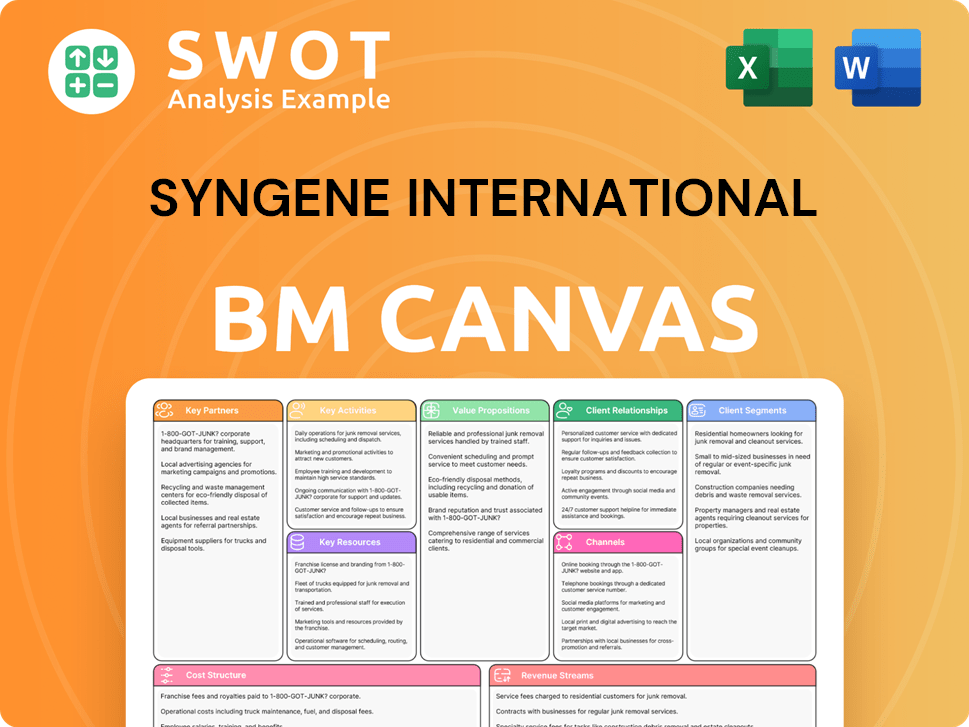
What is the Timeline of Key Events for Syngene International?
The Mission, Vision & Core Values of Syngene International has a rich history, marked by significant milestones. The
Indian biotech
company, initially a subsidiary of Biocon, has evolved into a leadingbiopharmaceutical company
, expanding itsbiologics research
and manufacturing capabilities over the years.| Year | Key Event |
|---|---|
| 1993 | Syngene International Private Limited is incorporated in Bengaluru, India, as a subsidiary of Biocon. |
| 2000 | Clinigene International Limited (CIL) is incorporated as a 100% subsidiary of Biocon to provide clinical research services. |
| 2001 | Syngene ventures into chemical development with a dedicated manufacturing facility. |
| 2002 | 99.9% of Syngene's equity shares are transferred to Biocon, making it a Biocon subsidiary. |
| 2007 | The company converts to a public limited company, changing its name to Syngene International Limited. |
| 2009 | A Syngene-Bristol Myers Squibb research facility is established in Bengaluru. |
| 2012 | Syngene collaborates with Abbott to open India's first nutrition R&D center. |
| 2015 | Syngene International is listed on Indian stock exchanges (NSE and BSE). |
| 2017 | Broadening of Research Collaboration with Amgen Inc. and expansion of Bristol-Myers Squibb's ongoing research collaboration. |
| 2022 | Syngene signs a 10-year biologics manufacturing agreement with Zoetis Inc. |
| December 2023 | Syngene completes the acquisition of a multi-modal biologics manufacturing facility from Stelis Biopharma for Rs 617 crore. |
| March 2025 | Syngene announces an additional investment of up to $56 million in its US subsidiary, Syngene USA Inc. |
| Q4 FY25 (ended March 31, 2025) | Syngene reports total income of Rs 1,036.9 crores, crossing the Rs 1,000 crore quarterly threshold for the first time, and a net profit of Rs 183.3 crores. |
Syngene is focusing on both geographical and capability expansions. The newly acquired US biologics facility, expected to be operational in the second half of 2024, will significantly boost their presence in the US market. This expansion includes adding end-to-end services.
For fiscal year 2026, management anticipates reported revenue growth in the mid-single digits. While the EBITDA margin is expected to moderate to the mid-twenties due to operational costs and depreciation, the long-term outlook remains positive. Total income in FY25 reached Rs 3,714.2 crores, with a net profit of Rs 496.2 crores.
Syngene is making incremental investments in biologics manufacturing. The acquisition of a facility from Stelis Biopharma in December 2023 added 20,000 liters of biologics drug substance manufacturing capacity. The US facility will further increase bioreactor capacity to 50,000 liters.
The company is committed to innovation, including using artificial intelligence and machine learning. This will help reduce drug discovery timelines and costs. Syngene's strategy focuses on building its pipeline in both small and large molecules, supported by new pilot programs.
Syngene International Porter's Five Forces Analysis
- Covers All 5 Competitive Forces in Detail
- Structured for Consultants, Students, and Founders
- 100% Editable in Microsoft Word & Excel
- Instant Digital Download – Use Immediately
- Compatible with Mac & PC – Fully Unlocked
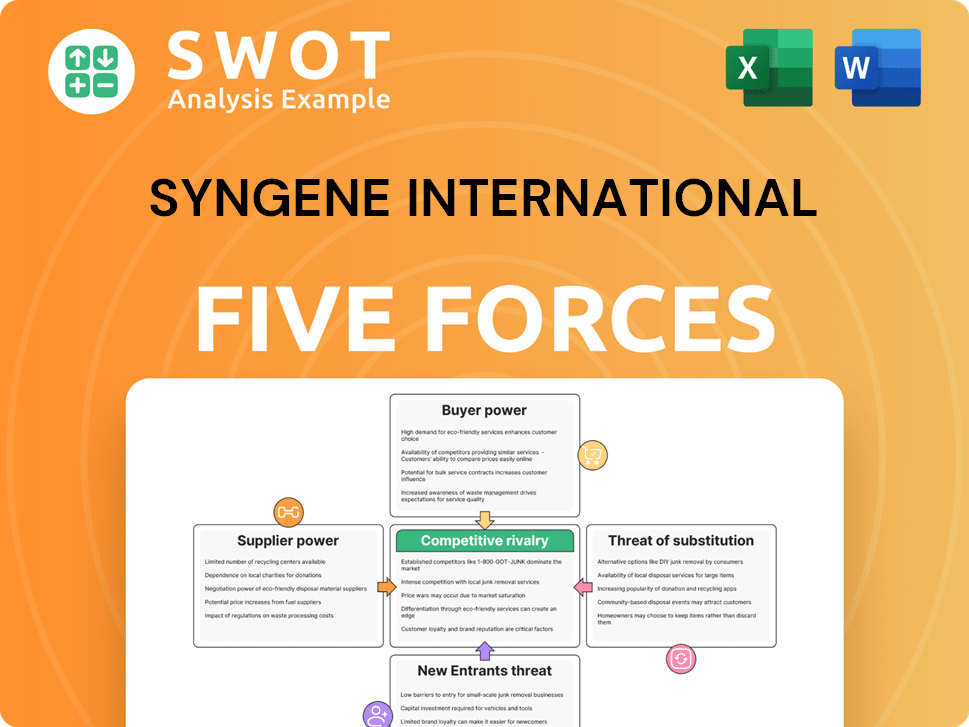
Related Blogs
- What is Competitive Landscape of Syngene International Company?
- What is Growth Strategy and Future Prospects of Syngene International Company?
- How Does Syngene International Company Work?
- What is Sales and Marketing Strategy of Syngene International Company?
- What is Brief History of Syngene International Company?
- Who Owns Syngene International Company?
- What is Customer Demographics and Target Market of Syngene International Company?
Disclaimer
All information, articles, and product details provided on this website are for general informational and educational purposes only. We do not claim any ownership over, nor do we intend to infringe upon, any trademarks, copyrights, logos, brand names, or other intellectual property mentioned or depicted on this site. Such intellectual property remains the property of its respective owners, and any references here are made solely for identification or informational purposes, without implying any affiliation, endorsement, or partnership.
We make no representations or warranties, express or implied, regarding the accuracy, completeness, or suitability of any content or products presented. Nothing on this website should be construed as legal, tax, investment, financial, medical, or other professional advice. In addition, no part of this site—including articles or product references—constitutes a solicitation, recommendation, endorsement, advertisement, or offer to buy or sell any securities, franchises, or other financial instruments, particularly in jurisdictions where such activity would be unlawful.
All content is of a general nature and may not address the specific circumstances of any individual or entity. It is not a substitute for professional advice or services. Any actions you take based on the information provided here are strictly at your own risk. You accept full responsibility for any decisions or outcomes arising from your use of this website and agree to release us from any liability in connection with your use of, or reliance upon, the content or products found herein.